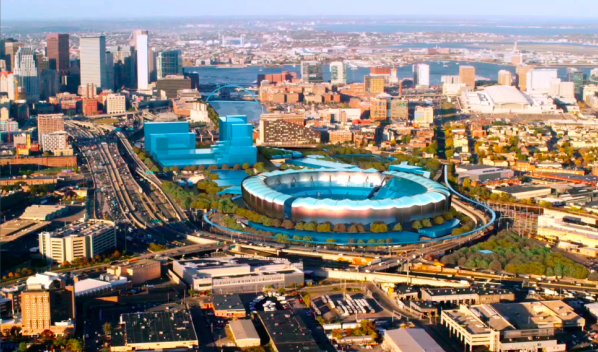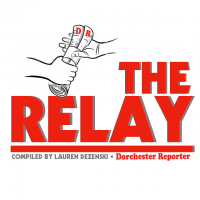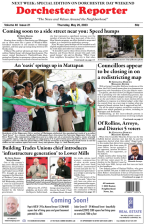June 15, 2015

A rendering of the proposed temporary stadium at Widett Circle and the mixed-use development for the larger Midtown area from the first draft of Boston 2024's bid to host the 2024 Summer Olympic Games. Rendering courtesy Boston 2024.

Boston 2024 is exploring a number of different options to show it can produce a privately funded Olympic Games, sources have confirmed to the Reporter.
One such option in the works, primarily for the temporary stadium site at Widett Circle and future mixed-use development at Midtown, is a so-called “master developer” plan, in which a well-established local developer would purchase the parcels of land, develop to Olympic specifications, and bear the financial burden–or windfall–for the parcels.
Sources at Boston 2024 are careful to note that conversations have been fluid and no developer or specific plan of action has yet been finalized.
However, the master developer plan represents the first tangible example of a privately funded Boston Games. Specifics still stand to be fully fleshed out in the days and weeks before the so-called Bid 2.0 plan is released by Boston 2024 by June 30.
In the first iteration of the bid, rolled out to the US Olympic Committee in December, Boston 2024 planned to use a trust established between the city and state to acquire and finance development of the Midtown land.
Under the master developer plan, in theory, the developer would bear the financial burden–or gain, at no cost to the city. Specifically at Midtown, a source involved with negotiations says discussions have revolved around building a deck over an existing MBTA yard to create a platform laden with lines for utilities and other resources necessary for a subsequent neighborhood. The platform could cost up to $1 billion.
This spring, the Midtown price tag was estimated to be $351 million, according to Boston 2024’s estimates reported in The Boston Foundation’s study of the Boston Games’ potential economic impact. The New Boston Food Market parcel, which occupies Widett Circle, has been previously assessed at $21 million.
Bid 2.0, sources confirm, will also not rely on eminent domain as Mayor Martin Walsh has made it clear that his City Hall will not exercise such a right to acquire land for the Olympics. Walsh has also stated public money will be needed for transportation infrastructure around the Games.
If the master developer plan goes forward, those selected by Boston 2024 would be already well-versed with the ins and outs of development in Boston–including the Boston Redevelopment Authority’s Article 80 process for vetting large projects with the community. The selected so-called master developer would also be able to front the private capital necessary to acquire and develop the land, removing the need for public funds outlined in the initial bid.
Boston 2024 previously estimated hosting the Games would cost $9.1 billion.
In January, Boston 2024’s former president and current vice chair John Fish announced that he would recuse himself and his successful Boston-based construction firm Suffolk Construction from Olympic-related development.
While the latest vision for Midtown–the newly named swath of land stretching from Widett Circle north in the bend of Interstate 93 on the Dorchester/South Boston/South End line–has come into focus, details remain hazy around the proposed Athletes Village for Columbia Point and how Olympic planners could navigate on a Dorchester peninsula already carved up by often competing public and private interests.
As Boston 2024 CEO Rich Davey and others have noted, the forthcoming second version of the bid, which details what a Boston Games would look like, is subject to change and input as the bid process continues.
“Between the venue-specific questions, the good news is that Venue 2.0 isn’t the end either,” Davey told the Reporter in April. “There is probably going to be a 3.0 and a 7.0 and a 20.0 when all of this is said and done.” It will also include full financial information not initially included in the previous bid, sources say.
Boston must file its declaration as the US’ host city by Sept. 15 with the International Olympic Committee. Boston must then file an updated bid with the IOC in January 2016. In the spring of 2016, the IOC narrows its field to a shortlist. As Rich Davey told the Boston City Council, the US has never not made the shortlist. The IOC selects the 2024 host city in September 2017.
Get the inside track on Boston’s bid to host the Olympic Games in your inbox every Thursday from the Reporter’s Lauren Dezenski: Subscribe to The Relay.
Tags:



